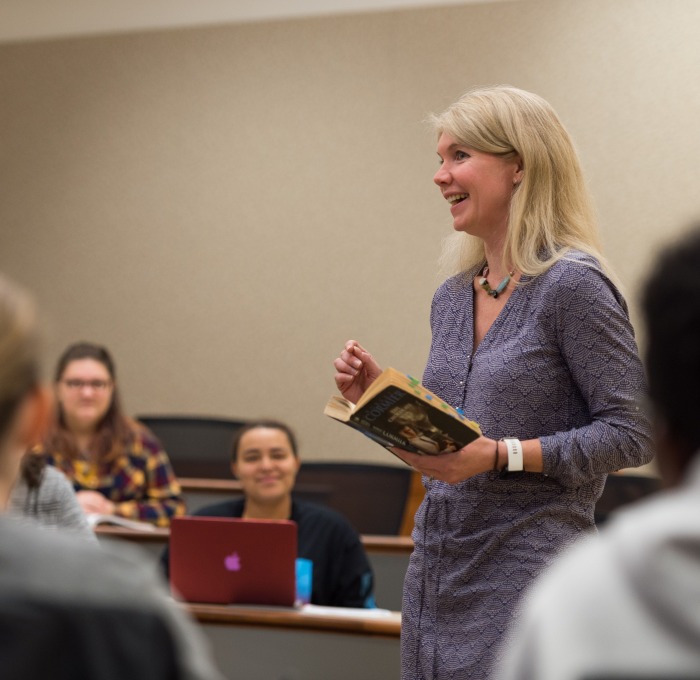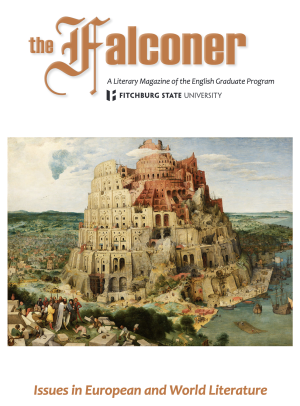
In Short
A graduate study in literature, culture, and teaching that connects you to a diverse and impressive community of teachers, scholars, and writers. 100% online with some synchronous components.
- Explore major literary theories and the history of English as a discipline
- Study diverse voices from across the globe and over many different time periods from Medieval Literature and Shakespeare's Major Plays to 20th Century Women's Fiction and Africa through the Novel
- Bridge the gap between cutting-edge scholarship and classroom practice
- Enable practicing teachers to expand strategies for teaching literature through the application of current modes of criticism
Program Overview
The MA program grounds students in periods, genres, theories, and canonical authors, while at the same time paying attention to contemporary issues and developments in the discipline. Our program includes a strong representation of ethnic, multicultural, and world literature via film, graphic novels, and digital literature in addition to covering canonical English language literature. The program has the following two possible emphases: (1) Literature and (2) Teaching. Students This is a 30-credit online program with some synchronous components, including either 24 credits of coursework and 6 credits of thesis work, or 30 credits of coursework and an exit exam.
Learn more about our graduate English programs by watching the webinars and video below to hear from faculty and students.
The English MA's Literature emphasis offers advanced graduate work in literary and cultural studies, featuring a range of diverse canonical and non-canonical authors and texts across multiple genres and media, connections to multiple academic and professional futures, and the opportunity to produce a culminating MA thesis. The MA is tailored for students interested in literary studies, writing, research, or college teaching and provides a background for those planning to go on to doctorate programs.
The English MA's Teaching emphasis develops the scholar-teacher by building on candidates' academic and professional experience to develop a strong specialization in English language literature and in the theories and methodologies for teaching English. Students have the opportunity to produce a culminating pedagogical action research thesis. Completion of this degree enables the teacher with an initial teaching license to self-petition to the Department of Elementary and Secondary Education (DESE) for professional licensure in the state of Massachusetts.
Learn more about our Creative Writing Certificate. It's a 12 credit, 100% online certificate for students looking to practice their craft with actively publishing authors.
Time Frame
While you can complete the program in as few as 3 years, you have 6 years to complete the program.
Career Opportunities
- English teacher in middle or secondary schools
- College professor
- Writer, editor, or publisher
- Literature or research specialist
Curriculum and Other Information
- MA, English - Program information from the University Catalog.
- Two-Year Course Rotation (PDF)
Ethnic, multicultural, and world literature
- ENGL 9048 Multicultural Children’s Literature
- ENGL 9061 Africa Through the Novel
- ENGL 9064 Three American Literatures: Native American, African American, and Asian American
- ENGL 9066 Latin American Novels
- ENGL 9067 Asian English Literature in Cultural Context
- ENGL 9004 Contemporary Ethnic American Literature
American and British literature
- ENGL 9011 The Literature of the Middle Ages
- ENGL 9020 Shakespeare’s Major Plays
- ENGL 9035 Revisiting the Romantics
- ENGL 9040 Mark Twain and American Humor
- ENGL 9052 20th-Century British and American Poetry
- ENGL 9055 Modern Irish Literature
- ENGL 9026 American Satire
Gender and cultural studies
- ENGL 9060 Women Writers Around the World: Stories of Maturation and Initiation
- ENGL 9025 Romantic Women Writers
- ENGL 9036 The Quiet Revolution: 19th-Century American Women Writers
- ENGL 9047 Women in European Literature
- ENGL 9065 Women in Contemporary Society
- ENGL 9072 British Representations of Disability and Disease
- ENGL 9023 Women in World Cinema
Literature and media
- ENGL 8085 Literature and Film
- ENGL 9015 Folklore in American Culture
- ENGL 9017 Genre, Adaptation and Hybridity
- ENGL 9046 American Art and Literature 1800-1860
- ENGL 9044 Graphic Novel as Literature
- ENGL 9003 Resisting the Page: Media Conscious Literature
Teaching
- ENGL 7010 Children’s Literature
- ENGL 7012 The Modern Secondary School
- ENGL 7020 Teaching College Writing
- ENGL 7850 Advanced Special Methods in English
- ENGL 8000 Advanced Methods of Teaching at the Secondary Level
- ENGL 8070 Literature in the Classroom
- ENGL 8071 Literature for Young Adults
- ENGL 8076 Creating Literacy Experience: Building Reading and Writing into the Content Areas
Our graduate student theses cover a wide range of topics and interests using literary, cultural, or rhetorical frameworks. Students develop their research projects with the liberty to follow their own inquiries and the security of faculty support. Some thesis titles of recent graduates include:
- The Merry War: Love and Courtship in Much Ado about Nothing and Cinematic Adaptations by Joss Whedon
- 20th Century/Current Asian-American Writers and Motherhood
- Sensibility, Sexuality, and the Woman in 18th Century Literature
- The Battle for your Hearts and Minds: The Occupation of Iraq, information warfare, and American war culture
- Protest and Promotion: Hip Hop's Oral Narratives of the Black American Identity Crisis
- Native American Hybrid Leaders: Layers of Feminine Identity with the First Native American Women Writers Sarah Winnemucca and Mourning
- Rage and Redemption in Boxing Films and Literature: An Analysis
- Tomboys in the American South
As a graduate journal, The Falconer has published student and alumni essays and articles since 2010 since replacing our previous journal, The FSC Review. Journal volumes are thematically defined. Our most recent volume themes were:
- Romantic Women Writers
- Analyzing 21st Century America
- Fringe Literature
- American Art and Literature 1800-1806
- Satire
- The Art of Memory
You can view an archive of our English literary journals.
The English Studies department hosts a Graduate Colloquium series featuring talks by faculty, graduate students, alumni, and guest speakers. Some of our recent talks include:
- Dr. Wafa Unus "Facts are not Truth: Why Journalism Education and Media Literacy Matter"
- Dr. Kisha Tracy “Cultural Heritage, Image, and the Student of the Pre-Modern”
- Dr. Diego Ubiera “Critical Pedagogy and Paulo Freire’s Pedagogy of the Oppressed”
- Dr. Steven Edwards “Critical Exploration: A Pedagogy of Listening”
- Dr. Albert Turner “Resistance Made Futile – African-American Vigilantism in the Post- Civil Rights Era Fiction of John Edgar Wideman, Chester Himes, and Toni Morrison”
- Ross Caputi “Theory of Reparations: Extending Praxis to Theory”
- Dr. Benjamin Railton “History, Hope, and Critical Patriotism in American Literature”
- Dr. Heather Urbanski “Joyful Disruption: Narratology and the Science Fiction and Fantasy Franchise”
- Students will produce graduate-level scholarship in the study of literature and culture.
- Students will research and respond to fellow literary and cultural studies scholars.
- Students will develop a wide range of literary knowledge, including a global perspective.
- Students will polish and expand their writing style and techniques.
- Students will explore major literary theories and the history of English Studies as a discipline.
- Students will refine and expand their pedagogical philosophies and practices.
Completed applications are reviewed on a rolling admission basis. Admissions requirements are as follows:
- Official transcript of a bachelor’s degree preferably with (but not limited to) a major or minor in English from a regionally accredited institution
- Three letters of recommendation
- Professional resume
- Official transcripts of graduate level course work from a regionally accredited institution (if applicable)
- Graduate application and fee
Still have questions? We're here to help!
We know you're busy, so we've given you a few different options to conveniently get the answers you need. You can…
- Email an enrollment counselor gce@fitchburgstate.edu or call 978.665.3182
- Attend an information session
- Watch a webinar
